|
|
|
Sort Order |
|
|
|
Items / Page
|
|
|
|
|
|
|
| Srl | Item |
| 1 |
ID:
073765
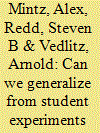

|
|
|
|
|
| Publication |
2006.
|
| Summary/Abstract |
The authors conducted an experiment with a group of military officers and replicated it with a group of students at a public university in the United States. The experimental scenario dealt with a decision problem in the area of counterterrorism. The authors found that while more than one-third of students recommended doing nothing, the overwhelming majority of military officers (more than 90 percent) recommended doing something. Also, military officers exhibited less maximizing and more satisfacing decision making than students. The results show that relying on experiments with students "playing" the role of real-world national security policy makers may bias the results. The two groups are, in fact, very different. Based on student samples, it is possible to accept propositions that would not be found with samples of elite decision makers and reject propositions that may be right. However, it is possible that students can be assigned to experiments where they represent the "public" and not elites.
|
|
|
|
|
|
|
|
|
|
|
|
|
|
|
|
| 2 |
ID:
073762
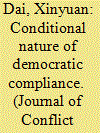

|
|
|
|
|
| Publication |
2006.
|
| Summary/Abstract |
Do democratic institutions enhance a country's compliance with international commitments? The author develops a game-theoretic model that highlights the conditional nature of democratic institutions' effect on compliance. Rather than assuming that the electorate in a democracy benefits from compliance uniformly, the author considers domestic distributional consequences of compliance. The model thus incorporates the preferences of competing domestic constituents as well as their politically relevant attributes such as electoral leverage and informational advantage. The model shows that, although electoral institutions intensify politicians' accountability to domestic constituents, the direction of this electoral effect on compliance is determined by the political attributes of competing interests. The author illustrates this theory with examples of international economic and environmental policies.
|
|
|
|
|
|
|
|
|
|
|
|
|
|
|
|
| 3 |
ID:
073763
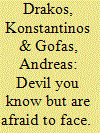

|
|
|
|
|
| Publication |
2006.
|
| Summary/Abstract |
Despite substantial progress in the applied study of terrorism, one important methodological issue has remained underdeveloped. Multiple warnings have urged for caution as the validity of extant findings may have been distorted from the well-known "devil" of underreporting bias. Yet, extant research has fallen short from addressing the issue in a systematic fashion. This article discusses a way for assessing whether underreporting is present by using the widely studied relationship between terrorism and regime type as its laboratory. After formally presenting a setup for the accommodation of underreporting bias, the authors discuss how it relates to press freedom. According to their results, underreporting is indeed present, implying that the used databases for terrorism represent an understatement of the true number of terrorist incidents.
|
|
|
|
|
|
|
|
|
|
|
|
|
|
|
|
| 4 |
ID:
073764
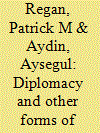

|
|
|
|
|
| Publication |
2006.
|
| Summary/Abstract |
Much of the empirical literature suggests that outside interventions tend to lengthen the expected duration of civil wars; conversely, the policy community often acts as if it holds the opposite expectation for the outcome of intervention. The authors argue that the divergence can be found in how models of intervention are specified in the literature. They propose a model with two novel contributions. First, they incorporate mediations as the key to resolving the strategic problems that the civil war parties face. Second, they account for the decaying effect of interventions over time. Their results suggest that diplomacy is critical for understanding the duration of civil conflicts. They find that mediation has a dramatic effect on the expected duration of a civil war and that when controlling for diplomatic efforts, economic interventions can also reduce the expected duration.
|
|
|
|
|
|
|
|
|
|
|
|
|
|
|
|
| 5 |
ID:
073760
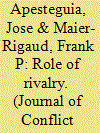

|
|
|
|
|
| Publication |
2006.
|
| Summary/Abstract |
Despite a large theoretical and empirical literature on public goods and common-pool resources, a systematic comparison of these two types of social dilemmas is lacking. In fact, there is some confusion about these two types of dilemma situations. As a result, they are often treated alike. In line with the theoretical literature, the authors argue that the degree of rivalry is the fundamental difference between the two games. Furthermore, they experimentally study behavior in a quadratic public good and a quadratic common-pool resource game with identical Pareto-optimum but divergent interior Nash equilibria. The results show that participants clearly perceive the differences in rivalry. Aggregate behavior in both games starts relatively close to Pareto efficiency and converges quickly to the respective Nash equilibrium.
|
|
|
|
|
|
|
|
|
|
|
|
|
|
|
|
| 6 |
ID:
073761


|
|
|
|
|
| Publication |
2006.
|
| Summary/Abstract |
The concept of international affinity-albeit under different names-captures a central place in international relations research. This study examines how different types of affinity affect the likelihood of conflict between states. The authors discuss different types of affinities as these appear in the realist and liberal paradigms. They offer a social networks conception of structural affinity-the concept of structural equivalence-which reflects the similarity of international ties across a set of different networks. They test the hypotheses derived from these paradigms, using both existing measures of affinity and their own structural equivalence measures. Their findings suggest that (1) strategic affinity has a consistent dampening effect on the probability of dyadic conflict, (2) trade-related affinity does consistently affect the probability of dyadic conflict, and (3) intergovernmental organization-related affinity has a negative impact on conflict, mostly in the twentieth century.
|
|
|
|
|
|
|
|
|
|
|
|
|
|
|
|
| 7 |
ID:
073759
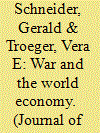

|
|
|
|
|
| Publication |
2006.
|
| Summary/Abstract |
One of the perennial questions in the scientific study of war is how war affects the economy. The authors examine the influence that the political developments within three war regions had on global financial markets (CAC, Dow Jones, FTSE) from 1990 to 2000. They embed a rational expectation framework within commercial liberalism, a theoretical strand that tries to assess the interrelationship between war and economic exchanges. Time-series analyses account for the effects that the conflict between Israel and the Palestinians, the first confrontation of a U.S.-led alliance against Iraq, and the wars fought in Ex-Yugoslavia exerted. Using daily stock market data, the authors show that the conflicts affected the interactions at the core financial markets in the Western world negatively, if they had any systematic influence at all. They argue that these results lend some support to the rational expectations version of commercial liberalism.
|
|
|
|
|
|
|
|
|
|
|
|
|
|
|
|
|
|
|
|
|